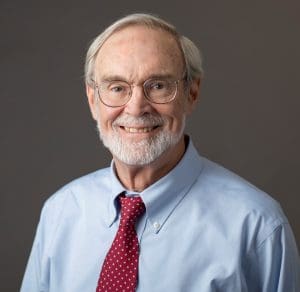Meet the Board: Charlie Pillsbury
Mediators Beyond Borders International is a nonprofit organization governed by a Board of Directors, comprised of 17 remarkable individuals. This article is the first of the Meet the Board series—putting faces to the decision-makers, guiders, and advisors of MBBI.
Meet the Board: Charlie Pillsbury

Charles Pillsbury, Director or Dispute Resolution, at the School of Law at Quinnipiac University.
It’s not everyday, that you meet someone who contributed to the growth of alternative dispute resolution in the United States–and then to the growth and success of Mediators Beyond Borders. Charlie Pillsbury, a “recovering lawyer” and mediator, transitioned from law to direct a community mediation center in 1989. It was a center modeled on the successful community boards program in San Francisco and established in an era when the Department of Justice was expanding its local justice centers for ADR across the country.
Charlie directed the community mediation center and practiced as a mediator for 20 years, until an email brought Mediators Beyond Borders into his life. In 2007, he was working at his desk when into his inbox jumps a message: Contribute $1 a day to mediation to help bring world peace. “One dollar a day to bring world peace? Now that’s a deal,” Charlie laughs. Charlie was one of the first 150 people to donate to MBBI, and thus became a founding member.
“I didn’t think much about it,” he says, until a few months later he received an invitation to attend the first Mediators Beyond Borders Congress at St. Malo’s retreat center in Colorado. Curious to see what he had helped fund, Charlie flew from his east-coast community to Denver in February of 2008. “It was an Alice in Wonderland experience,” he says. “I’d been so steeped in community mediation that I had not appreciated the broader world of [conflict resolution].”
Over the next six months, “the stars were aligning,” Charlie says. At the congress, he met John Paul Lederach (“He’s just a superstar in my book”), who shared a mutual friend, Ricardo Esquivia, working on peace and conflict issues in Colombia. Charlie was soon engaged in a Latin America interest group that developed two projects in Ecuador and Colombia.
MBBI’s first local partner in Colombia was Sembrandopaz, a Mennonite organization working in war-ravaged communities in the Montes de Maria region in northern Colombia. Many of its communities had little to no active government present. “You get to places where the state doesn’t operate, and the only institutions are the church and the school,” Charlie says. In one community of about 500 people, MBBI’s team and Sembrandopaz held a “workshop laboratory” with local leadership to discuss the types of conflicts faced by this “community of return”, which had been completely displaced several years earlier. Not unlike communities back home–and a reflection of Charlie’s work as a community mediator–the rural community was struggling with bored teenagers. The teens, who had grown-up internally displaced in the city, were not used to the pace of the community. The resulting partnership helped the community establish restorative justice circles, as well as historical memory circles that were open to the entire community.
Charlie’s interest in Latin America has remained constant in his time with MBBI, even as his role within the organization has shifted. In 2009, on the brink of retirement from the community mediation center, Charlie received yet another life-changing email from MBBI. The organization was looking for a volunteer interim executive director. “I can do that,” Charlie thought. He applied, was hired, and began the work of steering MBBI until his resignation at the start of 2014 when he transitioned to a part-time position at a law school.
“It was time for new leadership, as fate would have it,” he says, reflecting on a conversation with Prabha Sankaranarayan in D.C. in December 2013. She was interested in becoming the next executive director. “Let’s switch places,” Charlie told her. “You become the executive director; I’ll join the Board as treasurer.” And that’s precisely what they did.
Now, at the start of a new decade and over 10 years after Charlie first volunteered for the role of interim executive director, he asks: “What do we do in the next ten years?”
“[MBBI is] moving from a project-focused organization into a training organization. I think that’s a significant shift,” Charlie says. “People are asking for training because they’ve seen our work and want to be a part of this enterprise. After years of operating below the radar, we’re now a known international peacebuilding organization. I’m excited about our future.”
Perhaps it is no coincidence that Charlie reengaged in Colombia for a training program in 2016. With Catalina Chaux-Echeverri and Macarena Mata, MBBI, Rotary clubs in Bogota and California, and a local Mennonite organization called Mencoldes joined forces to build local conflict resolution skills. It was MBBI’s first International Peace Training Institute of women conducted fully in another language. “It’s one of the reasons we’re planning to do our next International Peace Congress in [Latin America],” Charlie says.
“We’re not the conflict resolvers,” he says. “In the early years, people thought we were dropping mediators from airplanes with parachutes to mediate local conflicts. MBBI goes beyond borders, but we don’t mediate there. We train local leaders to do the mediating, coach them, mentor them, support them: that’s our job. Their success is our success.”
“I’ve been living and breathing this organization for 12 years. I remain committed to do what I can. To some extent, it’s an outgrowth of my work as a community mediator — taking the conflict resolution skills I learned in my community and helping communities around the world.”
“The fundamental idea is that somehow, we can find a way to export peace, instead of exporting arms, guns, and soldiers,” Charlie says in conclusion. “Right now it’s counter-cultural, but–maybe–one day it’ll be the norm.”
Article by Emily Zmak, MBBI Writer
